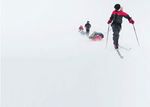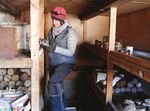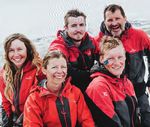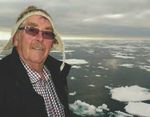EExplorer - Antarctic Heritage Trust
←
→
Page content transcription
If your browser does not render page correctly, please read the page content below
Explorer
THE
JULY 2018
Inspiring Explorers’ Epic Expedition
Crossing the Greenland ice cap. © Keith Parsons
They battled hurricane conditions, heavy out to be an illusion! We continued to ski New Zealand outdoors company
snowfalls and illness, but the six-person and eventually saw mountains – there was Kathmandu sponsored the expedition with
Antarctic Heritage Trust Inspiring Explorers’ great excitement after seeing nothing but the team road testing their new XT Series,
Expedition reached the finish line of their a flat, white horizon for weeks. We stopped designed for extreme environments.
560-kilometre crossing of the Greenland for a hot meal at 1.00am before reaching
The expedition was hugely challenging
ice cap almost a month after they set off. the end of our journey at 7.00am – there
for all team members both physically and
They made the journey on skis while pulling were hugs and tears of relief.”
mentally. Hollie Woodhouse had never been
60-kilogram supply sleds behind them.
The expedition honoured Fridtjof in a polar environment, and wasn’t sure
Antarctic Heritage Trust selected four Nansen, the renowned polar explorer and what to expect. She says she was “totally
young explorers for the expedition from a humanitarian, who completed the first out of my comfort zone, but I’ve come out
pool of nearly 200 applicants. Two Kiwis; crossing of Greenland 130 years ago in 1888. stronger because of it.” Hollie notes that
Brando Yelavich (24) and Hollie Woodhouse
Keith, who was in charge of filming content Continued on page 2
(33) and two Australians; Bridget Kruger
(30) and Keith Parsons (28), were joined on the expedition said, “It was
by Executive Director Nigel Watson and special for me to have Nansen’s story
Ousland Polar Exploration master polar as the backbone for the trip. The
guide Bengt Rotmo. sheer audacity of what he did 130
years ago, to get a bunch of capable
The team left the west coast of Greenland people together, put two dots on the
on May 4 and arrived in the small village map and say “we’re going between
of Tasiilaq (on Greenland’s east coast) on them” without regard for his or
Saturday, 2 June. others’ lives, was astonishing. During
The crossing is the Trust’s third Inspiring the expedition I often reflected on
Explorers’ Expedition and proved to be the what it would have been like for
most challenging yet. Nansen’s team, who hunted fresh
food across the ice cap and slept in
Nigel Watson says the team’s final day saw reindeer skins. In contrast, we ate
them ski for 21 hours. our freeze-dried food while wearing
the best gear money could buy.” Bridget, Hollie, Brando, Keith and Executive Director Nigel
“We set off at 10.00am. A possible polar
Watson after their month long crossing of the Greenland ice
bear sighting had us on edge, but it turned cap. © Keith Parsons
Newsletter of the Antarctic Heritage Trust (New Zealand)
Copyright © 2018 Antarctic Heritage Trust. All rights reserved.Inspiring Explorers’ Epic Expedition
© Keith Parsons
continued
"It is rare in today’s world for people to be able to extract
themselves from their everyday lives and focus and
challenge themselves in this way.” Nigel Watson
apart from a selection weekend earlier in the east coast of
the year, “we were a team of strangers who Greenland was in sight.
were put in a hostile environment and had Bridget Kruger describes
to rely on each other. Early on, I knew I was the final descent: “It was a
with an amazing group of people whom I magical, fantasy-like day. We started to
could trust and who would have my back.” see mountains emerge out of the vast
Her advice to others is to never give up. whiteness around us – the first real thing we
“Having the courage to do that first scary had seen in 27 days. As the mountains grew
Trust undertakes
step or do that thing you have dreamed into view, we skied closer to the sea and
these expeditions is to encourage people to
about can lead to a whole lot of new were finally going downhill. It was a lot of
get out and explore the amazing world we
adventures.” fun. As the day grew into night, the sun set
live in. By sharing their story, the team has
over four or five hours, blanketing us in this
One mental challenge the team faced was the opportunity to inspire someone else to
stunning light that sparkled off the snow.
a lack of external stimulus for 29 days, do something they never have before – an
The moon was rising, a huge, gorgeous
travelling through a vast white landscape experience that could be life changing.”
fiery orb. The scene looked like we were
that seemed endless. Brando Yelavich Thank You
skiing down on this sea of clouds to meet
says, “The various landmarks, including a The Trust would like to acknowledge
the moon. It was the most beautiful evening
massive old radar station at the halfway expedition sponsor Kathmandu and
of my life, and the images will be forever
point, were the only things we could hold on expedition partner Ousland Polar
imprinted on my memory.”
to as a goal to reach. It was quite tough on Exploration for helping make the trip
my brain as I have ADHD and need a lot of The team are now delivering outreach possible. Thanks also to Lumix, Rode and
stimulation with physical things. Some days programmes supported by the Trust, with GoProNZ for the use of camera gear
being on the ice was like looking at a blank the aim of sharing their experiences, and and equipment.
canvas but having no inspiration to paint.” encouraging others to get out and explore.
In the last 21 hours of the expedition Nigel says that will be the most important Visit inspiringexplorers.com for the
fully story and photos/video.
everyone agreed it was awe-inspiring as part of the expedition. “The reason the
Alumni News
Congratulations to Isobel Ewing
(Inspiring Explorer 2017) for winning the
Environmental/Sustainability Award at
the 2018 Voyager Media Awards.
A huge congratulations to Dr David
Harrowfield (the Trust’s first Executive
Director) who has had a hill in the
Antarctic named after him! ‘Harrowfield
Hill’ is situated on Inexpressible Island,
near the site where Scott’s Northern
Party were forced to winter in 1912 after
Alumni
their ship Terra Nova was unable to reach
them due to heavy pack ice.
Programme
© Dr David Harrowfield
Launched
Isobel Ewing during crevasse training. © Simon Lucas
We are delighted to launch our Alumni Programme. Celebrating our 30th anniversary last
year we reflected on the incredible people that have helped care for the early explorer
bases in Antarctica and shared the Trust’s stories to engage the next generation with the
spirit of exploration. The Alumni Programme connects nearly 100 past staff, conservators,
Antarctic Youth Ambassadors, Inspiring Explorers and volunteers. If you have worked for
the Trust and haven’t heard from us please do get in contact as we are in the process of
updating our records. We have a dedicated private Facebook group and new LinkedIn page lease email info@nzaht.org to update
P
your details and receive an alumni
and welcome you to join us online there and to receive regular communication updates
welcome pack.
from the Trust.Conserving Stonington Stories
The abandoned ‘Base E’. © Lizzie Meek
“Like seeing Antarctica for the first time” Stonington itself is a very active site,
is how Lizzie Meek (Programme Manager with a constantly calving glacier in
– Artefacts) described her experience the adjacent bay, and the shingle
at Stonington Island on the Antarctic beaches occupied by Weddell,
Peninsula. fur, crab-eater and leopard seals.
Constant and noisy companions
In partnership with our sister trust UKAHT,
are the nesting Antarctic terns
AHT staff worked as part of a 10 week
and skua, and later in the season a
programme to survey the buildings
small collection of moulting Adelie
and artefacts left on Stonington Island.
penguins sheltered amongst the
Changing places with Trust Programme
rock outcrops.
Manager Al Fastier part way through
the season, Lizzie spent six weeks in Trust Executive Director Nigel
tent accommodation, cataloguing, Watson says, “The Trust is
photographing and labelling just over delighted to share its extensive
6,000 artefacts. knowledge with UKAHT around
Lizzie working on the artefact survey. © Lizzie Meek
cold-climate conservation based
Like some other historic sites the UKAHT
on our experience of conserving the early
manages on the Antarctic Peninsula, Base
explorer bases at Ross Island and the wind whirls down the glacier from the top
‘E’ was deliberately abandoned, meaning
20,000+ artefacts they left behind. Over of the peninsula at speeds of 150kph.
that only a few emergency supplies were
many years, conservators working on the
left behind. With fewer site visits and Although many things (tents, limited food,
Ross Sea Heritage Restoration Project
alterations than the Ross Island huts, the cold toes, snow and rusty tins) were similar
have developed innovative and detailed
layers of history are simpler and easier to to working at the Ross Island huts, there
methodologies for treating artefacts from
understand at Stonington. are some noticeable differences, including
the world’s most extreme environment.”
diverse wildlife, higher tourist numbers, and
The logistics to reach Stonington are
The survey revealed that the bulk of items more modern materials involved.
challenging however, and rely on the
to be conserved at Stonington are food tins
goodwill and strong relationships UKAHT Overall it offered Lizzie a fresh perspective
and parts relating to the Lister generator
has built up with the IAATO tour ship on Antarctica. She says, “An incredible
set (that provided electricity for the base).
companies, and The Royal Navy. It takes environment and history, challenging
Conditions on the island are challenging
a week by ship from either South America logistics and conservation issues, plus
for artefacts, being wetter and saltier than
or the Falklands, and then good luck with working with a team and organisation who
Ross Island. The buildings get drenched in
the sea ice conditions to be able to make a share our passion for preserving historic
salt spray, which is picked up and hurled
landing on the island, and offload enough Antarctic sites - it doesn’t get much better!”
horizontally across the island by the
equipment to supply a six-person team for
infamous ‘Fumigator’ katabatic wind. The
10 weeks.
Governance
We farewelled Professor Sir David Skegg who stepped down as representative of the Royal Society of New Zealand taking effect on
30 June 2018. We thank him for his six years of service. We welcome Professor Richard Bedford who will represent the Royal Society of
New Zealand from 1 July 2018.Antarctic Conservation Update
Antarctic Youth Ambassador (2017) Chris Ansin digging out snow at Cape Royds as part of the regular maintenance programme. © AHT
Alongside the annual monitoring and Cape Adare from late January to undertake Antarctic Programme. The team now
maintenance programme, a focus for the Year 2 of the Cape Adare Conservation look forward to beginning the building
team this season will be on finishing the Programme. This site is historically conservation work, which is expected to
conservation of the artefacts from Butter significant as this is where Borchgrevink’s take a couple of seasons to complete.
Point and Inexpressible Island. The artefacts Hut was erected by the first expedition
Trust staff will continue to support UKAHT
are from a range relating to sledging team to land on the continent, making the
in Year 2 of their long term conservation
expeditions, including a sled, tools, Nansen hut Antarctica’s first building. A field camp
programme, surveying historic huts on the
cooker and boxes of provisions. was successfully installed at Cape Adare
Antarctic Peninsula.
earlier this year by Antarctica New Zealand
Subject to obtaining logistical support,
with support from the Chinese National
seven heritage specialists will be based at
A Cool Change for
Adventurous Drop Manage Your Data
Long time Trust supporter Allan Scott Wines are delighted to reveal a new Following recent changes in data
look for their Scott Base wine. Although the Scott Base vineyard in Central management regulations we wish to
Otago was named in honour of treasured Scott family holiday memories, remind you that you are welcome to
the serendipitous link to Sir Ed’s legacy in Antarctica has become a key update your data and communication
touchstone as the vineyard continues its partnership with Antarctic preferences at any time. We will not share
Heritage Trust. A percentage of all sales of their premium product are your data with third parties and will only
donated to the Trust. Their Cromwell vineyard offers wines made only send you information relating to the Trust
in small quantities, carefully crafted to give full expression to their and its work.
regional characters. With absolute focus on harvesting only the best
fruit by hand, the wine has a velvety depth and intensity unique to
T
o update your communication
the Scott Base range. The new-look Scott Base Pinot Noir, Pinot Noir preferences, or have your personal
Reserve and Chardonnay will be on sale in July at fine wine retailers information removed from the
across New Zealand, online (www.allanscott.com) or – if you’re up database, email info@nzaht.org or
for an adventure – straight from the cellar door. The Trust gratefully ring +64 3 358 0212.
acknowledges the ongoing support.
PRINZ Finalists Thank You
The team was delighted to be awarded We welcome the following new member:
a highly-commended at the 2018 Public
Relations Institute of New Zealand awards Bronze Brian Honeybone (NZ)
for the watercolour media campaign. In If you would like to support our work, we
2017 conservators discovered a 118-year would welcome your donation or support as
old watercolour amongst the Cape Adare an Antarctic Explorer Club member.
artefacts. Painted by Dr Edward Wilson, it
generated global media interest. Thank you More information on how to support the
to Great Scott Communications for their Trust can be found on our website.
partnership on this special project. © AHT nzaht.org
Antarctic Heritage Trust, 38 Orchard Road, Christchurch, New Zealand. Private Bag 4745, Christchurch 8053
T: +64 3 358 0212 E: info@nzaht.org W: nzaht.org
Copyright © 2018 Antarctic Heritage Trust. All rights reserved.You can also read


























































